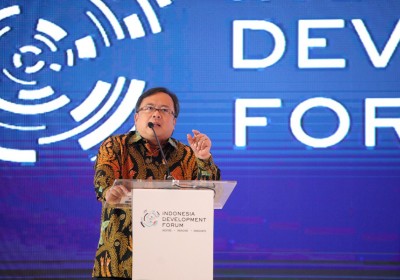Long-Term Policies Reduce Inequality
August 10, 2017
The government’s efforts to reduce inequality and poverty rates are oriented for the long-term. This is why development initiatives today are focused on infrastructure, which take a long time but support a more sustainable economic growth in all layers and all regions.
National Development Planning Minister Bambang Sumantri Brodjonegoro said inequality in the Indonesian society today is caused by four things: unequal opportunities from birth, unequal distribution of employment opportunities, inequality due to high concentration of wealth in certain groups, and inequality caused by low economic resilience.
From an economic perspective, those conditions pose a very big threat, as they did in the 1990s. At the time, the Indonesian economy relied heavily on a number of business conglomerates. The country’s GINI coefficient had also been increasing significantly, and when those conglomerates collapsed in 1998, it caused a major domino effect.
Bambang added that during the 2005-2015 period, there was a significant increase in the GINI index from 0.363 to 0.413. During that period, the Indonesian economy was growing relatively fast, with a large number of foreign investors, particularly in the coal and palm oil sectors. This growth reached its peak in 2009-2011, when the economy grew above 6%. Economic growth in the upper-middle class during that period also pushed the GINI ratio from 0.375 to 0.410.
“Efforts made to improve the livelihood of lower income groups at the time were through the distribution of direct cash assistance (Bantuan Langsung Tunai/BLT). Such instant efforts resulted in nothing in the long run,” Bambang said.
During 2025-2030, Indonesia will enter the “demographic bonus” period, which can provide economic benefits if majority of the income-earning population has the skills to work, and employment opportunities are available. If not, it can turn into a social disaster.
“Therefore, starting from now, we are preparing our human resources by developing vocational education and improving the labor market. If we don’t prepare right now, we are worried that social issues that could have been caused by [today’s] inequalities would emerge even before that [demographic bonus] period,” Bambang said.
In terms of fund distribution, the government has been disbursing amounts higher than in 2009-2014. However, the funds are channeled through specific programs and activities in various fields, such as Program Keluarga Harapan (PKH) or Family Hope Program, where the government distributes Rp2 million per impoverished family per year for specific expenses. The policy is similar to Bolsa Familia or Conditional Cash Assistance in Brazil.
Indonesia’s Research Institutions Supporting the Development of the Electric Vehicle Industry
Indonesian Muslim Fashion and Cosmetics IKMs Shine at Dubai World Expo 2020
Govt Steps Up UMKM Transformation Efforts in the Midst of Pandemic Slowdown
Govt Encourages Promotion of IKM Products in Digital Era
Government Begins Developing Maritime Training Center in Makassar
Tweets by IDDevForum
